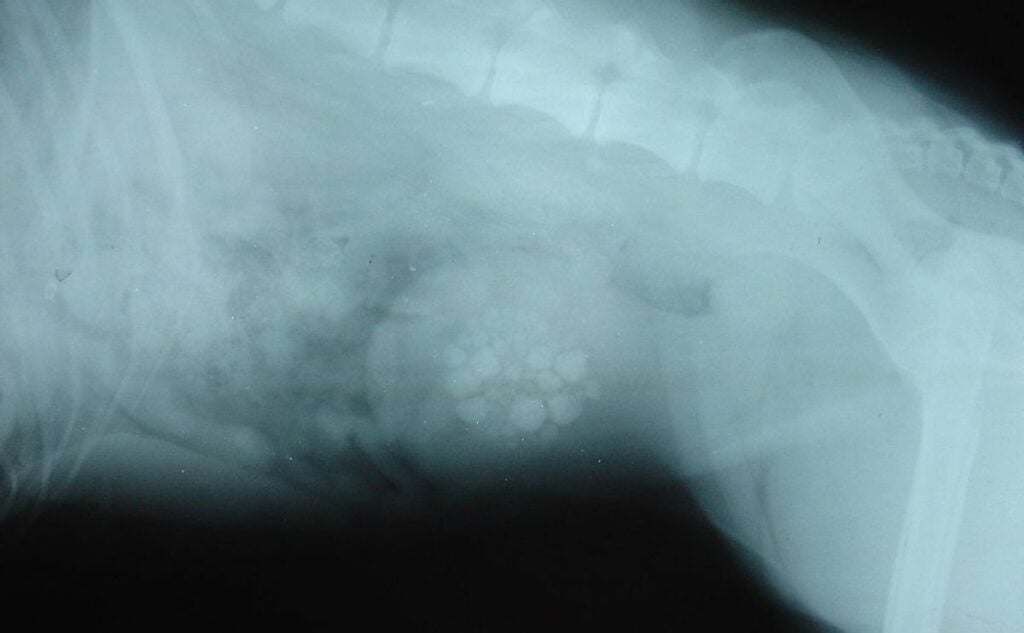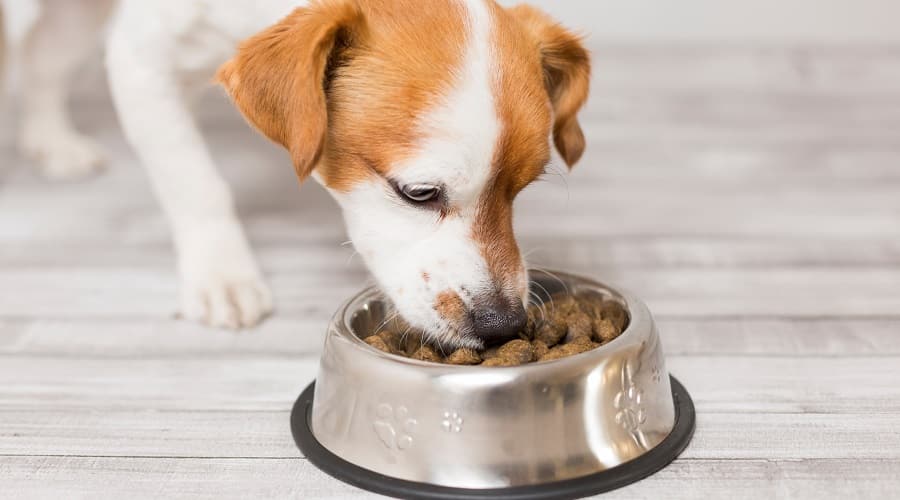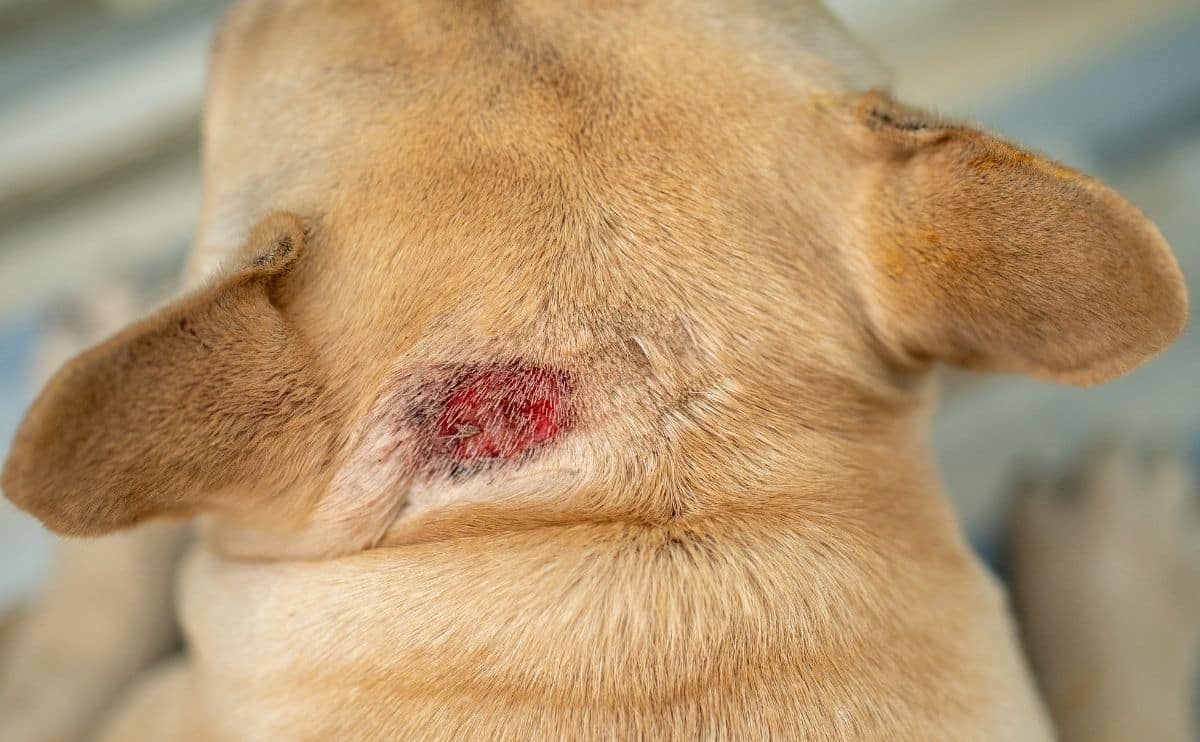Bladder Stones In Dogs: Causes, Symptoms, Treatment & More
When you purchase through links on our site, we may earn a commission. Here’s how it works.

It can be a terrifying moment when you realize your dog has blood in his urine. The sight alone can cause you to go into panic mode. But did you know that bladder stones might be the culprit? They’re more common than you may think.
Table of Contents
Luckily, there are lots of treatment options you and your vet can discuss. Learn more about what you can do to help your pup get rid of them and keep them from coming back.
What Are Bladder Stones?
Bladder stones, also known as uroliths or cystic calculi, are mineral calcifications that form in the bladder when there is a high salt concentration in urine. They look like rocks and can range from small grains of sand to larger than a golf ball.
Types Of Bladder Stones In Dogs
The most common type of bladder stones found in dogs are struvite bladder stones. These stones have a mineral composure of magnesium ammonium phosphate and hexahydrate, known as struvite. They form when an infection is present. Bacterial infection in the urinary tract can raise the salt levels in urine, which sets the stage for crystals to form.
The other common type of bladder stones are calcium oxalate stones. Calcium oxalate bladder stones form when mineral levels in the urine are higher than usual. They are also referred to as urinary stones. Struvite and calcium oxalate make up most stones, but you may also find dogs with urate, xanthine, and cystine bladder stones.
All dogs can be affected by this condition, but some smaller breeds, like Shih Tzus, Miniature Schnauzers, Bichon Frises, Lhasa Apsos, and Yorkshire Terriers, are more likely to get bladder stones.
What The Vet Says About Bladder Stones In Dogs
I spoke with Dr. Hannah Godfrey, BVetMed MRCVS, to get a veterinarian’s take on bladder stones in dogs. Here’s what she said.
“Bladder stones can be uncomfortable for your dog but are also a serious concern. Although stones within the bladder can reach a surprisingly large size and even be spikey or rough, it’s much more concerning if a smaller stone passes through the bladder neck into the urethra. This is because if the stone gets stuck, which they commonly do in male dogs, it causes a blockage and means your dog can’t pass urine. Therefore, if your dog is straining to pass urine but not passing any, it’s a good idea to get them checked over by a vet quickly. It may just be cystitis, but it’s worth ruling out the possibility of a stone in their bladder or elsewhere in their urinary tract,” explains Dr. Godfrey.
She adds,” Over my years as a vet, I’ve had to remove stones of all shapes and sizes from bladders and urethras. I’m always amazed that dogs can show very few signs of being unwell despite having huge or vicious-looking stones in their bladder!”
“If your dog has bladder stones, your vet will usually have to remove them surgically, or certain prescription dog foods can help to dissolve small stones. After removal, a laboratory can determine the type of stone, and the vet can decide how to stop your dog from developing more. They might advise increasing their water intake or using a specific dog food that will change the pH of the urine. Unfortunately, if your dog has bladder stones, there’s not much you can do to help them. Thankfully, your vet can take a urine sample, perform an ultrasound scan or X-ray, and give treatment and advice,” says Dr. Godfrey.
What Are The Causes Of Bladder Stones?
Bladder stones form when the urine crystals increase. These crystals can develop because of changes in the urine’s pH levels, an increase in water resorption by the kidneys, diet, dehydration, or even an infection. Combining some of these factors creates the perfect storm and makes the bladder an ideal environment for stone formation.
Elevated uric acid levels, or Hyperuricosuria, can change the PH levels in urine and cause bladder stones. This disease is an autosomal recessive disorder and is inherited. You can give your dog a simple inherited disease test from Easy DNA to see if he is genetically susceptible to Hyperuricosuria or even if he’s a carrier.
Most often, urine is full of stone-forming crystalline compounds. When that compound exceeds a certain level, crystallization occurs. The crystals that form irritate the bladder lining, which causes mucous production. When the mucous and crystals combine, they harden into stones and can grow.
Bladder stones can form in as little as two weeks or take several months to develop. Formation time depends on the environment in the bladder, the concentration of the urine, and the amount of infection present.
Symptoms Of Bladder Stones
Here are some of the signs you may see if your dog has bladder stones.
- Blood in urine
- Straining to urinate
- Pain
- Inflammation of the bladder and urethra
Diagnosis And Treatment
If you notice your dog has symptoms consistent with bladder stones, especially blood in their urine, it’s time to visit the vet. They can make a proper diagnosis and recommend the right treatment options.
Diagnosis
It’s hard to diagnose bladder stones by just looking at your dog. Urinalysis is usually a part of this process, and although your vet may be able to feel large stones, they’ll likely need to do an x-ray or ultrasound to see what’s going on.
How To Treat Bladder Stones In Dogs
Treatment may vary depending on several factors, including the type of stone, the size of the stone(s), and the number of stones in the bladder. You may have more options when the stones are smaller and not preventing the flow of urine.
If you don’t treat the bladder stones or obstruction occurs, the bladder can rupture. This situation is a life-threatening event and may require immediate emergency surgery.
Your vet will determine your dog’s needs and likely recommend one of the following three options.
Diet

When possible, the vet may suggest a special prescription diet along with antibiotics to dissolve the struvite crystals. Changing your dog’s food and increasing water consumption is the most natural treatment option available. However, there are some issues with using diet as a treatment.
- You have to know which type of stone it is to determine the right diet.
- It takes at least six to eight weeks to see if it’s working.
- Some dogs won’t eat the special food.
- You can’t give your dog any supplements or treats during the diet.
Non-Surgical Removal
There are three types of non-surgical treatments to remove bladder stones.
- Urohydropropulsion: During this procedure, a special catheter passes through the urethra into the bladder, and water flushes out the stones.
- Cystoscopy: Vets use a tool called a cystoscope, which they insert into the urethra and bladder to view the stones. Sometimes, the veterinarian can remove smaller stones with this tool.
- Ultrasonic Dissolution: This procedure uses ultrasonic sound waves to break up the stones into smaller pieces so they can be flushed out.
Sometimes, one of these procedures is necessary to remove a stone for analysis before your veterinarian can determine the right diet to dissolve stones. However, the procedure may not work, and the vet may recommend surgery.
Surgical Removal
When the vet can’t remove stones in another less invasive way, or there is an obstruction, surgery may be the only option.
The most common surgical procedure to remove the stones is Cystotomy. In this surgery, the dog is under heavy sedation or general anesthesia. The vet will open the abdomen to access the bladder and then open the bladder to remove the stones.
Surgery can be expensive, but it’s a routine procedure commonly performed by vets, and recovery is relatively quick for most otherwise healthy dogs.
Pet Insurance Can Help You And Your Pup
Remember that many costs can be associated with diagnosing and treating bladder stones. In fact, bladder and urinary tract disease is one of the top 10 most vet-treated conditions for dogs, and continued treatment can hit your finances.
You may consider signing up for pet insurance as a proactive measure to lower your financial risk for potential health threats during your dog’s lifetime. Why? Pet insurance is one of the best things you can do for your dog — not only for your pup’s health but to save you from financial trouble should an accident, illness, or pet emergency arise.
Just as we have health insurance for ourselves, our beloved pets can also benefit from this financial safety net. With pet insurance, you’ll never have to face the heart-wrenching choice between an expensive treatment and your pet’s well-being. It offers peace of mind, enabling you to make rational decisions in the midst of a crisis without the added emotional stress.
Check out our pet insurance reviews to learn more and get a quote for your pet below.
How To Prevent Bladder Stones
Depending on the type of bladder stones your dog has dealt with, you can make some dietary changes and do preventative screenings to prevent recurring stones. For stones that occur because of certain chemicals being present in the urine, your vet can recommend a special diet to avoid those chemicals building up again. If an infection is the culprit, periodic urinalysis can monitor for bacteria in your pup’s urine.
You can also use urine test strips at home to check for signs of bladder stones. Some test strips, like the KIT4CAT CheckUp At Home Wellness Test, can tell you if there’s blood in your dog’s urine. You may also consider adding a supplement like Natura Petz Organics Break It Up! to help limit stone formation and maintain a healthy urinary tract.
Either way, it’s crucial to increase the amount of water your dog is drinking to dilute the chemicals or bacteria in their urine. It’s also essential to remember that once your dog has bladder stones, it’s likely to occur again, so you need to take precautions.
Bladder Stones And Other Urinary Tract Infections
In this four-minute video from NTV News, Dr. Larson talks about bladder stones and other urinary tract infections your dog may face.
Frequently Asked Questions
I know there are still some questions about bladder stones in dogs. I’ve answered some of the top ones below, but if I didn’t get to you, let me know in the comment section.
What food causes bladder stones in dogs?
A diet with a higher carbohydrate content, low phosphorus, or that is unbalanced can cause urine pH to change. This can lead to urinary problems over time. A balanced diet from puppy days to senior years is ideal to keep your pup healthy.
How long can a dog last with bladder stones?
Bladder stones can form over time, usually several weeks to a few months. It can take weeks or even months for them to resolve and heal fully. However, a bladder obstruction can be life-threatening. If treatment is not sought right away, dogs can be in big trouble in just a few days. Because of this risk, you should never risk it if your pup is straining to pee or has blood in the urine. Seek treatment right away.
What dissolves bladder stones in dogs?
In some cases, bladder stones can be dissolved with a combination of antibiotics and a therapeutic diet. A prescription diet often includes food with lower protein, less carbs, and low sodium. However, there is not a specific food you can feed your dog that will dissolve crystals.
Can tap water cause bladder stones in dogs?
Most tap water is safe for dogs. However, hard tap water (water with high mineral content) can be a factor in a dog developing urinary crystals or bladder stones. Tap water contains elements and minerals like calcium, iron, and magnesium. While these are beneficial to dogs in excess amounts, they can contribute to health issues, including urinary tract infections, urinary crystals, and incontinence. More research needs to be done to fully understand how tap water might impact canine urinary health. However, avoiding giving your pup hard water can only benefit their health.
Of course, this all depends on the water quality in your area. You can contact your water utility to learn more about the levels or buy an at-home water testing kit. You can also give your pup bottled or filtered water if you like.
Keeping Your Dog Comfortable
Bladder stones can be an uncomfortable condition that can make your sweet pup feel pretty bad. The best you can do is be aware of treatments and prevention to make sure you can get them through this as smoothly as possible and keep those pesky stones from coming back. If you want to help your dog deal with bladder stones’ side effects, be sure to consider the benefits of CBD oil. Available as oil or treats, CBD may help keep your furry friend comfortable and calm while you weather this storm. Learn more bout finding the right CBD dosage for your pup in our guide.
Why Trust Canine Journal?
Since childhood, Danielle has shared a special bond with dogs. She has over 30 years of experience with dogs of all sizes and dogs with special needs. Danielle is a dedicated professional researcher and pet product reviewer. She spends countless hours researching the latest pet care, health developments, food, and training methods to help owners learn what’s behind the label. Danielle works with a professional and experienced team to bring the best, most accurate, and most up-to-date information to our readers.


